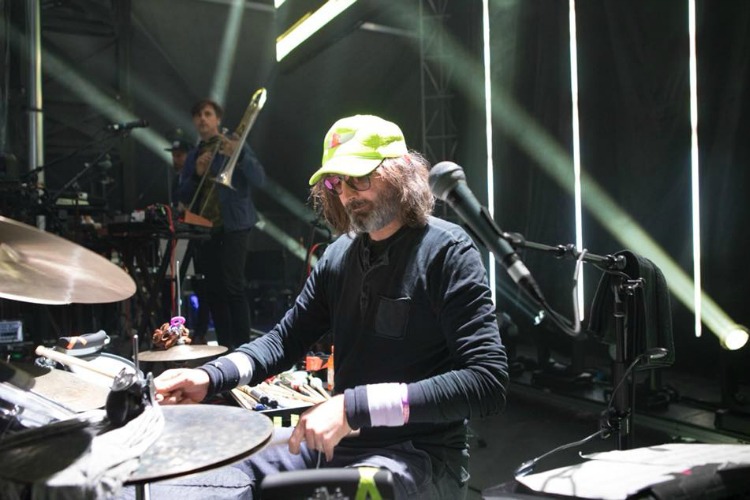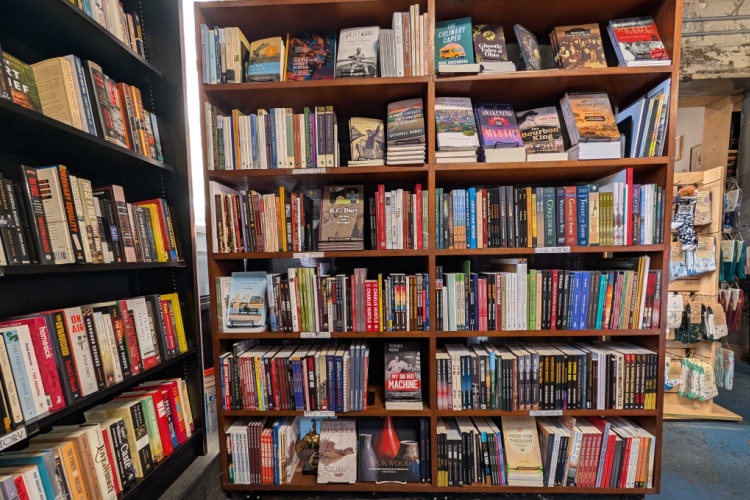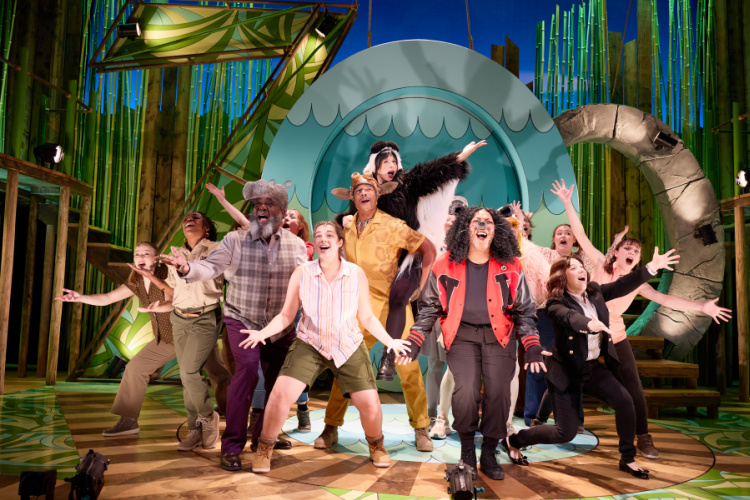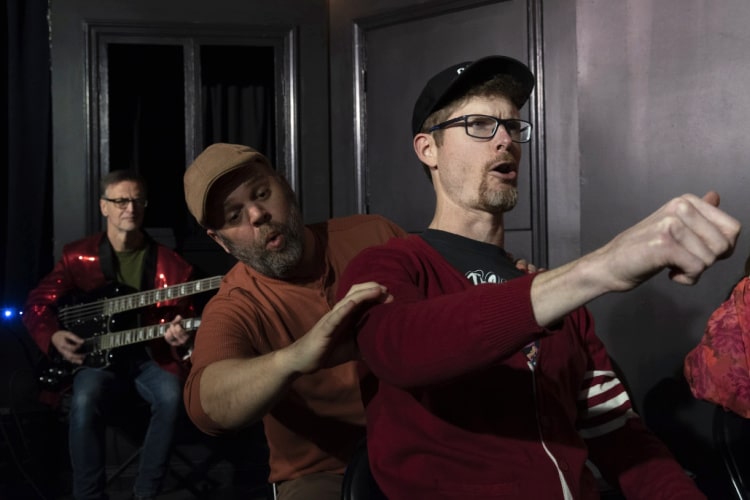The National drummer loops back to local roots
After years in New York City, Bryan Devendorf came home to raise kids and make music.

Reflecting back on his journey as drummer and founding member of The National, Bryan Devendorf weaves a tale steeped in Cincinnati names, places, and institutions. Once upon a time, in the late 70s, he and his brother Scott were both enrolled in Suzuki violin lessons at the University of Cincinnati College-Conservatory of Music (CCM).
While neither brother ultimately stuck with the violin, Devendorf says those childhood years of music lessons were undoubtedly formative, engraining in him the concept of practicing — breaking things down and doing something over and over, unglamorously, until it becomes second nature.
“They gave you like a Cracker Jack box with rubber bands to get you used to the awkward posture of the violin,” Devendorf reminisces.
In addition to laying the preliminary groundwork of their shared music career, CCM was also instrumental in exposing the brothers to the city itself.
“We lived in the suburbs and would go downtown occasionally, but seeing that there was an actual city there came through that musical training,” he says.
Becoming a drummer
It was while in junior high at Cincinnati Country Day (CCD), that Devendorf made the switch from strings to drums.
“A kid named Mike Hunting brought his drum set to school,” he says. “I could typically play a kick, snare, hi-hat, you know, a basic beat.”
The drums stayed at school, and he was at it day after day. Noticing his dedication, Devendorf’s parents let him trade in his violin for a drum set.
Shortly thereafter, he wandered into a small music shop on Beechmont Avenue and happened upon drummer Steve Earle who, at the time, was playing with the Afghan Whigs.
“It was just complete coincidence. I walked in the door, asked for drum lessons, and he’s like, ‘Hey my name is Steve, I’m in a band, I paint houses during the day.’ And he was usually covered in paint at all times,” he says.
While Devendorf was honing in on percussion, and catching some Afghan Whigs shows around town, his brother was shifting focus to the guitar, thus setting the stage for what now seems inevitable — a future career as bandmates. They met the Dessner twins while at CCD, but the two pairs of brothers didn’t begin playing music together until high school.
While Devendorf was in high school at Turpin, they started a band called Equinox, which played its fair share of Indian Hill house parties, armed with “half-hour versions of Grateful Dead songs or Allman Brothers stuff.”
Drum lessons on Beechmont continued until the day Steve said something to the effect of, “I’ve gotta go on tour with my band see ya,” says Devendorf, at which point he began going to see other teachers, most notably percussionist Elmer Monk out in Clermont County, who introduced him to a more Led Zeppelin-style rock.
Then came the move away from Cincinnati in 1993 to attend college in Cleveland. And, in 1997, the watershed shift from Ohio to New York City, together with his brother and his brother’s girlfriend, now wife, all packed into a U-Haul.
At that point in time — during what he describes as the era of 10,000 Maniacs and Ani Difranco — he was in a band called Project NIM, together with the Dessner twins, New Orleans vocalist Jenn Howard, and yet another set of brothers (also from New Orleans.)
Though Devendorf moved to New York City primarily for music, he also had some side-career aspirations of his own.
“I also wanted to break into book publishing,” he says. “You know, get a job in publishing, play in a rock band … two very sure ways of success.”
A Cincinnatian in New York
Hometown ties proved anything but irrelevant along the way. Devendorf notes that Cincinnatians have their own peculiar way of finding one another, no matter where in the world they happen to be.
“There’s this blob that forms,” he says.
“There was a ‘Cincinnati night’ at this bar downtown, and they would serve Skyline, LaRosa’s, and Graeter’s,” he recalls of life in New York. It turned out the bar was owned, he believes, by the uncle of now-former Red Sox player Kevin Youkilis, who also hails from the Queen City.
“He went to Sycamore High School,” he adds quickly, well aware of the nagging question that plagues every Cincinnatian.
It was through the expat community of sorts that Devendorf landed his day job in publishing.
“I ended up getting a job with a woman who had grown up here, went to Seven Hills [high school], and was a publicist/editor at a small book publisher,” he says.
As for music, The National came together in the summer of ‘99, comprised of the Devendorf brothers (drums and bass), the Dessner twins (guitar and keys), and frontman Matt Berninger (who, incidentally, went to St. Xavier High School.)

Fast-forward twenty years, and their Cincinnati-saturated, Brooklyn-based indie rock band has released seven studio records, won an international following, and garnered a good deal of critical acclaim, with their most recent record, Sleep Well Beast, snagging a Grammy in 2018.
Suffice it to say, day jobs have fallen by the wayside. And while the band remains resolutely together, its members have scattered to five separate home bases: Long Island, the Hudson Valley, Los Angeles, Paris, and Cincinnati.
Looping back to the hometown
“I never considered moving back [to Cincinnati] until like 10 or 12 years in,” Devendorf says.
Having kids changed things, though. Doing life in New York City — in a 900 square-foot apartment with a wife and two small boys — triggered some new desires, namely for a yard.
He and his wife have been back in town for six years now, raising their three kids in a walkable neighborhood with a good school and family nearby.
There are, of course, things to miss. The particulars of a place — tangible and intangible — that become engrained, like “the way the air is, the smell of the train, just walking around everywhere … and awesome food.”
But there is also plenty not to miss about the big city, he says, and Cincinnati has been a good place to come back to.
Though the band still relies on face-to-face time, their process now depends more on long-distance collaboration than it once did. And they are well equipped for it.
“I feel like our arsenal of self-owned studio gear has given us the ability to make much higher-quality sounding things,” says Devendorf.
Along the way, their sound has evolved to incorporate more electronic elements.
“Everything’s becoming more … I don’t know what the word would be,” he hesitates. “Like [an] ‘orchestral synth’ kind of thing.”
The band’s track record of political and social engagement has often gravitated toward public health and healthcare-related causes, and Devendorf has some ideas for how that might extend to Cincinnati. One thing he would love to support, locally, is a more critical look at environmental lead exposure and the treatment of kids with high lead levels.
It goes without saying that there are challenges that come with raising a family while being a professional, touring musician. But Devendorf is grateful that The National, unlike other bands, is never on the road for more than a few weeks at a time. And as the kids get older, there are also some fun aspects to it, too.
“They’re old enough now where they’re traveling to see the band in other places, so it’s less of a mystery, like, ‘dad just goes away and comes back,’” he says. “Now they kind of know what happens, so that’s really special. And actually the whole band has kids now, so sometimes whole sets of kids will come to shows or come to the studio.”
And having a solid home base certainly doesn’t hurt. “When I’m gone, there’s peace of mind knowing they’re here, because it’s relatively safe, they’re taken care of, and have a good mom.”
Moving forward with music, there is also a sense of possibility that’s shaped by what’s happening right here in town. There’s the newly renovated Music Hall, the concert venue being developed on the Banks, and the King Records legacy, Devendorf points out.
“I’d be curious to delve further into the King catalog — there’s actually a lot of cool drum beats to steal from that era,” he says.
“Another thing Cincinnati has is this world-class music conservatory,” he adds, circling back to where his own musical journey once began.
Would Devendorf ever encourage his own kids to tap into what CCM has to offer? As it turns out, one of his sons is already there, enrolled in Suzuki cello lessons.
This is the first story in an ongoing series about Cincinnati’s “boomerang” residents — people who grew up here, left, and then came back for various personal, professional, and sentimental reasons. If you or someone you know qualifies and would like to be featured in Soapbox, email editor@soapboxmedia.com.














